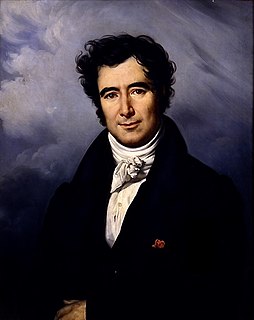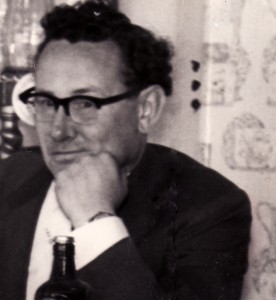A Quote by Francois Arago
The ancients had a taste, let us say rather a passion, for the marvellous, which caused grouping together the lofty deeds of a great number of heroes, whose names they have not even deigned to preserve, and investing the single personage of Hercules with them. In our own time the public delight in blending fable with history. In every career of life, in the pursuit of science especially, they enjoy a pleasure in creating Herculeses.
Related Quotes
The fable runs that the gods mix our pains and pleasure in one cup, and thus mingle for us the adulterate immortality which we alone are permitted here to enjoy. Voluptuous raptures, could we prolong these at pleasure, would dissipate and dissolve us. A sip is the most that mortals are permitted from any goblet of delight.
The single combats of the heroes of history or fable amuse our fancy and engage our affections: the skillful evolutions of war may inform the mind, and improve a necessary, though pernicious, science. But in the uniform and odious pictures of a general assault, all is blood, and horror, and confusion . . .
God has lent us the earth for our life; it is a great entail. It belongs as much to those who are to come after us, and whose names are already written in the book of creation, as to us; and we have no right, by anything that we do or neglect, to involve them in unnecessary penalties, or deprive them of benefits which it was in our power to bequeath.
I was remembering the things we had done together, the times we had had. It would have been pleasant to preserve that comradeship in the days that came after. Pleasant, but alas, impossible. That which had brought us together had gone, and now our paths diverged, according to our natures and needs. We would meet again, from time to time, but always a little more as strangers; until perhaps at last, as old men with only memories left, we could sit together and try to share them.
He thought about science, about faith, about man. he thought about how every culture, in every country, in every time, had always shared one thing. We all had the Creator. We used different names, different faces, and different prayers, but God was the universal constant for man. God was the symbol we all shared...the symbol of all the mysteries of life that we could not understand. The ancients had praised God as a symbol of our limitless human potential, but that ancient symbol had been lost over time. Until now.
When that much time goes by, you're really listening to your old music differently. At the time it's written, it was the beginning of our career and with every song we're thinking, 'This is what's creating us.' Now, nothing is creating us. We're well-created. We're there. It becomes just pure pleasure and you become sort of an archeologist of your own music. You don't judge it, because what's the point? It's a 30-year-old song. It just becomes fun.
Eternity is not a long time; rather, it is another dimension. It is that dimension to which time-thinking shuts us. And so there never was a creation. Rather, there is a continuous creating going on. This energy is pouring into every cell of our being right now, every board and brick of the buildings we sit in, every grain of sand and wisp of wind.
The truth is that there are no good men, or bad men,' he said. 'It is the deeds that have goodness or badness in them. There are good deeds, and bad deeds. Men are just men - it is what they do, or refuse to do, that links them to good and evil. The truth is that an instant of real love, in the heart of anyone - the noblest man alive or the most wicked - has the whole purpose and process and meaning of life within the lotus-folds of its passion. The truth is that we are all, every one of us, every atom, every galaxy, and every particle of matter in the universe, moving toward God.
Every life is punctuated by deaths and departures, and each one causes great suffering that it is better to endure rather than forgo the pleasure of having known the person who has passed away. Somehow our world rebuilds itself after every death, and in any case we know that none of us will last forever. So you might say that life and death lead us by the hand, firmly but tenderly.
I expect a time when, or rather an integrity by which, a man will get his coat as honestly and as perfectly fitting as a tree itsbark. Now our garments are typical of our conformity to the ways of the world, i.e., of the devil, and to some extent react on us and poison us, like that shirt which Hercules put on.
Judges of elegance and taste consider themselves as benefactors to the human race, whilst they are really only the interrupters of their pleasure ... There is no taste which deserves the epithet good, unless it be the taste for such employments which, to the pleasure actually produced by them, conjoin some contingent or future utility: there is no taste which deserves to be characterized as bad, unless it be a taste for some occupation which has mischievous tendency.
Whence came I, whither go I? Science cannot tell us a word about why music delights us, of why and how an old song can move us to tears. Science is reticent too when it is a question of the great Unity – the One of Parmenides – of which we all somehow form part, to which we belong. The most popular name for it in our time is God – with a capital ‘G’. Whence come I and whither go I? That is the great unfathomable question, the same for every one of us. Science has no answer to it.
To say that there is a case for heroes is not to say that there is a case for hero worship. The surrender of decision, the unquestioning submission to leadership, the prostration of the average man before the Great Man -- these are the diseases of heroism, and they are fatal to human dignity. History amply shows that it is possible to have heroes without turning them into gods. And history shows, too, that when a society, in flight from hero worship, decides to do without great men at all, it gets into troubles of its own.


































